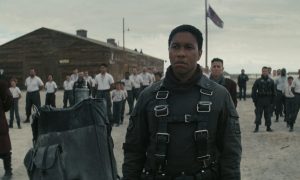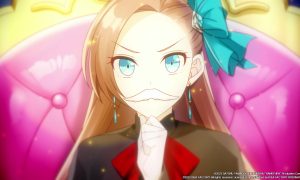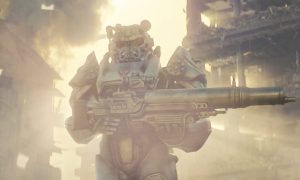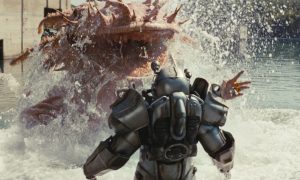Sword Art Online: Fatal Bullet is a third person shooter role-playing game, or an MMO-Lite for those that want to catch their breath, released on PS4, Xbox One, and PC worldwide on February 28th, 2018. It takes place in the universe designed by the source material, Sword Art Online, and follows the plot of the game’s predecessor, Sword Art Online: Hollow Realization. Diverging from previous installments, the player creates their own protagonist instead of piloting the anime’s characters, and sets out discovering the fictional MMORPG world of Gun Gale Online while solving the mysteries surrounding their new AI companion and balancing friendships along the way.
Sword Art Online, the source material, is a divisive anime that is either adored as one of anime’s greatest hits or hated as one of anime’s most miserable mysteries. If you’re into the anime scene, you probably have a strong opinion about it, and if not, nerd culture almost necessitates you know somebody with a strong opinion about it. That conversation is endless and will never die, but while this review isn’t an entry into the millennia-long debate, it’s important to acknowledge it to illustrate where this review is coming from. If you love Sword Art Online and played the rest of the game series, you probably already bought this game, and if you hate Sword Art Online and are a gamer, you probably never will. But what if you’re somebody else? What if you’re only remotely aware of the source material? What if you only picked up this game so you could play it with a friend? What should you expect?

If your response to your friend is “SAO sucks though,” you missed the point of friendship.
The most obvious thing to expect is that this is an MMO-Lite style game. Perhaps derivative of the source material, a game that models itself off a fictional MMORPG setting is bound to share some qualities, and the core gameplay loop encourages that. It’s the standard affair of grinding minions, dungeons, and bosses for material and loot to power up your gear and level up to enable you to fight stronger minions, dungeons, and bosses. Weapons are interchangeable; all roughly equal in killing power, affording the player personal choice in what gimmicks best align with what they value. Range, clip size, ammo cost, or overheating capacity, each weapon compliments a different player habit to where you’ll comfortably find what fits you. Swords are present, because this is Sword Art Online, so the melee option was mandatory. Enemy AI design is far from impressive, but provide a decent enough challenge to encourage the player to do more than spray and pray with their weapons. The game’s true multiplayer modes are clunky to work through, and are designed as material grinds instead of experience grinds, so if you have the motivation to level up you’ll probably avoid them.
I actually want to take the second to praise the Assist Mode built into the core gameplay loop. While perhaps advertised as “easy mode,” given how easy it is to turn on and off just with the tap of the D-Pad Assist Mode is a very clever tool the developers included for gameplay. It’s always better to aim down your sights to nail a headshot when you can, but you can’t always do this in the heat of battle, and killing generic mobs usually doesn’t warrant that sort of attention to detail. Some encounters aren’t kind to precise play anyways, whether you’re throwing a barrage of bullets from your gatling gun or forced to fire from the hip with your sniper rifle, and the freedom on gameplay besides aiming lets you indulge in other elements of the game. You can take a moment to soak in the art style or enemy design since you’re not focused on the aim reticle itself. And again, since it’s so easy to turn on and off, it’s a tool to be utilized rather than a clutch to commit to; when you need to buckle down and get as many critical hits as you can, turning off Assist Mode and focusing on your target enables skilled play, but when you want to relax in your MMO grind, you can turn it on and casually dish out the pain.
That said, the less you focus on your own efficiency, the more you see just how repetitive the gameplay is. The combat system itself is worth praise, but the movement patterns and tactics the enemy AI uses is as mind-numbingly boring as possible. Most MMO-Lite games have a “number” problem, where after some digging you discover the only real difficulty built into the game is your damage and armor compared to the computer’s, but Fatal Bullet is blatantly obvious with it, perhaps a consequence of the video game aesthetic of its source material. Enemies have levels, punch, and shoot, and you have levels, punch, and shoot. You can dodge most attacks fairly easily, and most enemies can’t, but either you can kill a mob in a clip, or they’re bullet sponges that will take 70 years to finally take down.

Only for them to drop some golden loot on the other side of the chasm which you can’t cheese across.
Enemy design is also a copy-and-paste nightmare. Robotic scorpions, bees, and humanoids run around in every zone with color pallet swaps, where the only true difference between generic mobs in the first zone with generic mobs in the second or third is their level. There’s only a handful of boss designs that they quickly repeat and reskin, a problem you discover early in its short single-player campaign. Sometimes it surprises you with the occasional Gundam style robot or something, and the “Player Character” enemy behaves uniquely enough to make the game world feel populated, but the game world ultimately feels bland and void of a creative soul. Were it actually the VR miracle that the source material presents itself as, a game reviewer could probably forgive the lack of creativity, but real life isn’t anime and you’re better off learning that sooner rather than later.
About that single-player campaign. The story pits you as a new player to Gun Gale Online, invited by your old friend Kureha who is trying to reconnect with you. After a moment of learning the ropes of the game and meeting your rivals, the story shifts to the consequences of finding the rarest item in the game, an artificial intelligence known as an ArFA-sys, from tracking down lost parts and memories and dealing with other players who are jealous of your rare treasure. This find also enables you to meet and become friends with Kirito, Asuna, Lisbeth, and the whole gang from the anime, since they think it’s really neat that you’re so lucky to catch such a rare find. The NPC friends you make accompany you on your MMO grind at your request, and it becomes a tale about balancing these relationships while discovering the purpose of your ArFA-sys, at least initially.

Plot!
The narrative floats in this weird nebulous space of recognizing it’s a virtual world and refusing to do so. Characters will reference the game space when cracking jokes at Klein or establishing dominance on the leaderboard, but they treat your ArFA-sys’s amnesia with a sort of human respect instead of considering it a game design element in this very obvious game world. It’s a friend who needs help, not designed gameplay, right? In one scene, a character will berate me for forgetting to give my ArFA-sys an allowance and treating it with the respect a partner deserves, but in the next scene characters will be jealous over the sheer utility my ArFA-sys offers as a tool and physical reward of the game instead of treating them with the respect a partner deserves. It’s designed gameplay, not a friend, right?
The AI being “my” ArFA-sys is probably the biggest dissonance here. Owning the mysterious tech is the way the plot encourages the player to become motivated in the mysteries of the game world while being a convenient plot device of wealth to make Kirito and friends care about you, but owning this very humanized thing is fundamentally weird. The game even presents other NPCs written as AIs; one from the anime and one from the previous game; acting as Player Characters with their own personal agency to further complicate this absurd relationship.
Should I own something fundamentally human? Yui and Premiere are AIs acting on their own, and that’s treated as perfectly normal instead of a technological miracle; why is my ArFA-sys functioning under this “Master/Servant” dichotomy also treated as normal? The characters and the plot want me to become invested in my ArFA-sys the same as or even more so than any other NPC, but why is it scripted as ownership and utility?
Can I “own” my “partner”?

This is worse than the ethical implications of Palicoes from Monster Hunter.
And then the girl subplot.
The game is acutely aware of the fact that the source material has more than one pseudo-love-interest for Kirito. Pseudo because it’s pretty clear that Asuna is the canon, established relationship, but golly gee it’s easier to talk about which female characters didn’t have a crush on him as a plot point. Jokes are made at the expense of how ridiculous Kirito’s circumstances are, as well as points of reference over the female player population and the general attitude of the male population. The game is not only aware of the culture it’s designed, but how that culture can be received, and acts to limit the criticism by making this part of its narrative, well, a joke.
It’s a cynical joke, that the world of Gun Gale Online is shy on female players because of dudes like Bazalt Joe or Klein, with the punchline being somehow men like Kirito can just surround themselves with women in spite of this. It’s absurd, the way the characters as written interact with one another when considering social norms and real life, and Fatal Bullet is cynical about this absurdity whenever it gets an easy chance to be. Coming in as a player only slightly aware of Sword Art Online, it’s quick to recognize this is an inside joke, probably designed like all postmodern media since the movie Deadpool to bridge the gap between those that hate the thing and those that love the thing, because at least everyone can laugh that the thing is silly, right?
It uses cynicism about these themes to justify them; you can’t make fun of it if it’s already roasting itself, right? Except whenever the flourish of women surrounding Kirito isn’t a punchline, the narrative plays the flourish straight, even so much as desirable with how it specifically makes fun of Klein. It’s unfortunate that there aren’t many girl players in the game, especially since there’s so many men running around doing their creepy thing, but gosh dang wouldn’t it just be great to be the next Kirito? Don’t you want to get a girlfriend and then be surrounded by cute girls all day?

“Corporate postmodernism is a lie born from marketing and focus groups,” is probably the most controversial thing I’ll say here.
The fact that it doesn’t really commit to the jokes, even going so far as to warp the humor into a narrative beneficial to how the player should perceive Kirito’s circumstances, feels shallow. Especially with that weird “Master/Servant” dichotomy going on with the ArFA-sys, I would rather have the game committed to Kirito’s entourage of women being “normal,” because all these jokes make me have to acknowledge it and it’s just weird, man. I can only ignore your weird-normal if you don’t point out your normal as weird, you feel me?
Which brings us the heart of the problem of Sword Art Online: Fatal Bullet. The plot and narrative it uses to distract you from the very bland and uninteresting game world is weird and ethically frustrating. Maybe I missed the memo about what a game about an anime about a game should be like, but this seemed like the perfect opportunity to expand on the universe of the anime in a way that very clearly demonstrates why their video game is a compelling video game. Do you know why these characters are excited to play this game? Because I don’t, not after playing myself. Instead, the game is uninterested in itself, relying on cheap laughs about ladies and narrating what all these characters’ personalities are instead of demonstrating through gameplay. The game would rather tell you what happened in a tournament than let you play the tournament, because it’s easier to tell you that Kirito and Asuna are kind rather than showing you.
On one hand, this could be the developers having no faith in the game world they designed, and using the source material as a clutch. But the way the opening cinematics play out with the game very clearly telling me the story was written by Reki Kawahara (author of Sword Art Online) suggests that the point was the be the anime. Much in the same way the anime focuses on the relationships between characters instead of the game worlds used as the setting, the story here focuses on the relationships between characters instead of actually playing the game. But that’s frustrating because this is a game; I only get to indulge in the power fantasy if I get act powerful, rather than being told through text boxes I played well. I only get to indulge in my character’s journey if I get to interact with my own agency, rather than being told that everyone wants to be Kirito through insulting dialogue choices.

And you thought Fallout 4’s “Yes, Rude Yes, Witty Yes, and More Info,” was bad.
Nothing about this game is inspired, and it’s a slog to grind through. The combat system itself is really good, and I can see myself playing this game casually every so often just for that. But there’s nothing for me in this game besides admiring Assist Mode; the plot robs my agency, the narrative is weird, and the difficulty is shallow. If you’re playing this game because your friend asked you to reconnect with them; if you have a real life Kureha that is introducing you to Sword Art Online for the first time with this game specifically; this game is probably a waste of your money. It doesn’t do enough with the tools it has available to be a compelling video game. And as a game about an anime about a game, it seems like a missed opportunity.
Calvin Neill Trager is a roughly 25-year-old house husband supporting his high school sweetheart as they storm the weather far away from their hometown of Michigan and reside out in the country of Japan, who spends his free time between practicing Magic, working to Platinum all of Kingdom Hearts on PS4, and writing.

Sword Art Online: Fatal Bullet, for somebody only remotely aware of the source material, is an enjoyable game with interesting tricks in design held back by an otherwise intrusive plot. Somebody who loves the source material will think the game deserves a higher score, and somebody who hates the source material will think the game deserves a lower score, but that's ultimately what holds the game back from being something successful; it wants to be the anime, not a game. And as a game about an anime about a game, it seems like a missed opportunity.
PROS
- Refreshing shooter mechanics
- Satisfying core gameplay loop
- All your favorite characters from the anime you love are there
CONS
- Clunky interface and poor plot design interferes with gameplay
- Shallow core gameplay loop
- Fake and uninteresting difficulty curve
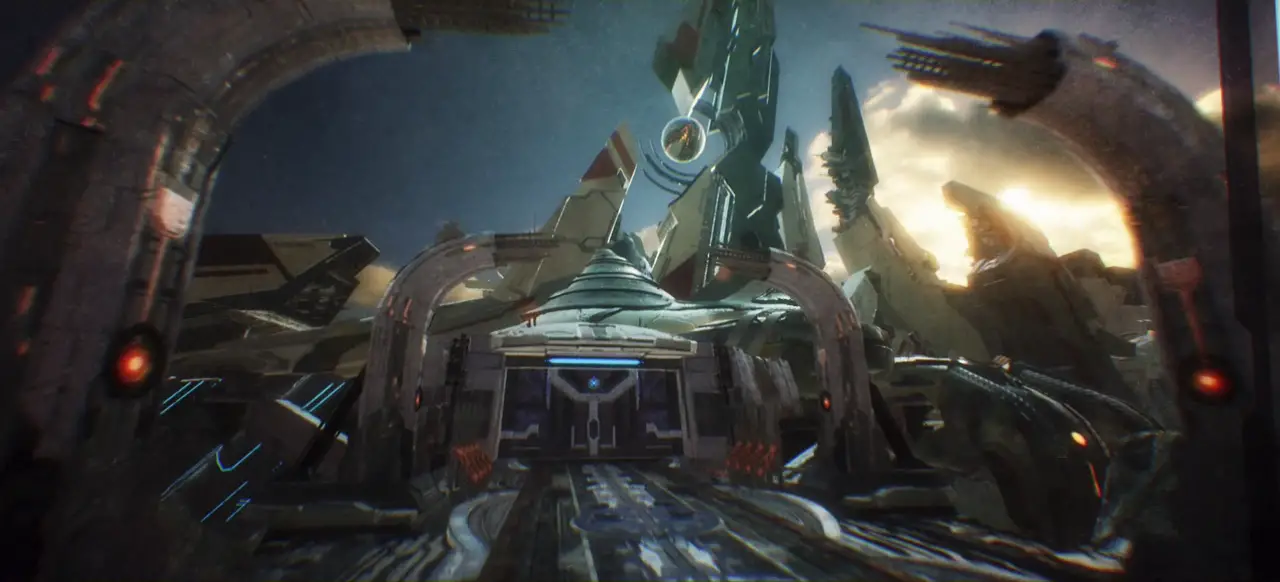
 Buy Now
Buy Now
 Buy Now
Buy Now
 Buy Now
Buy Now
 Buy Now
Buy Now
 Buy Now
Buy Now
 Buy Now
Buy Now
